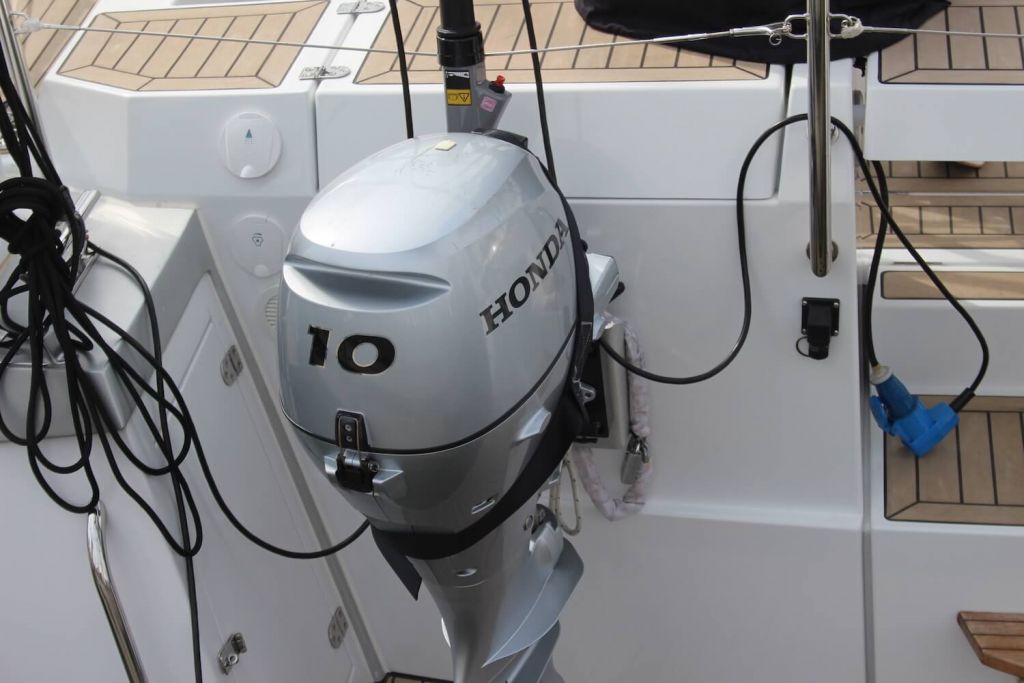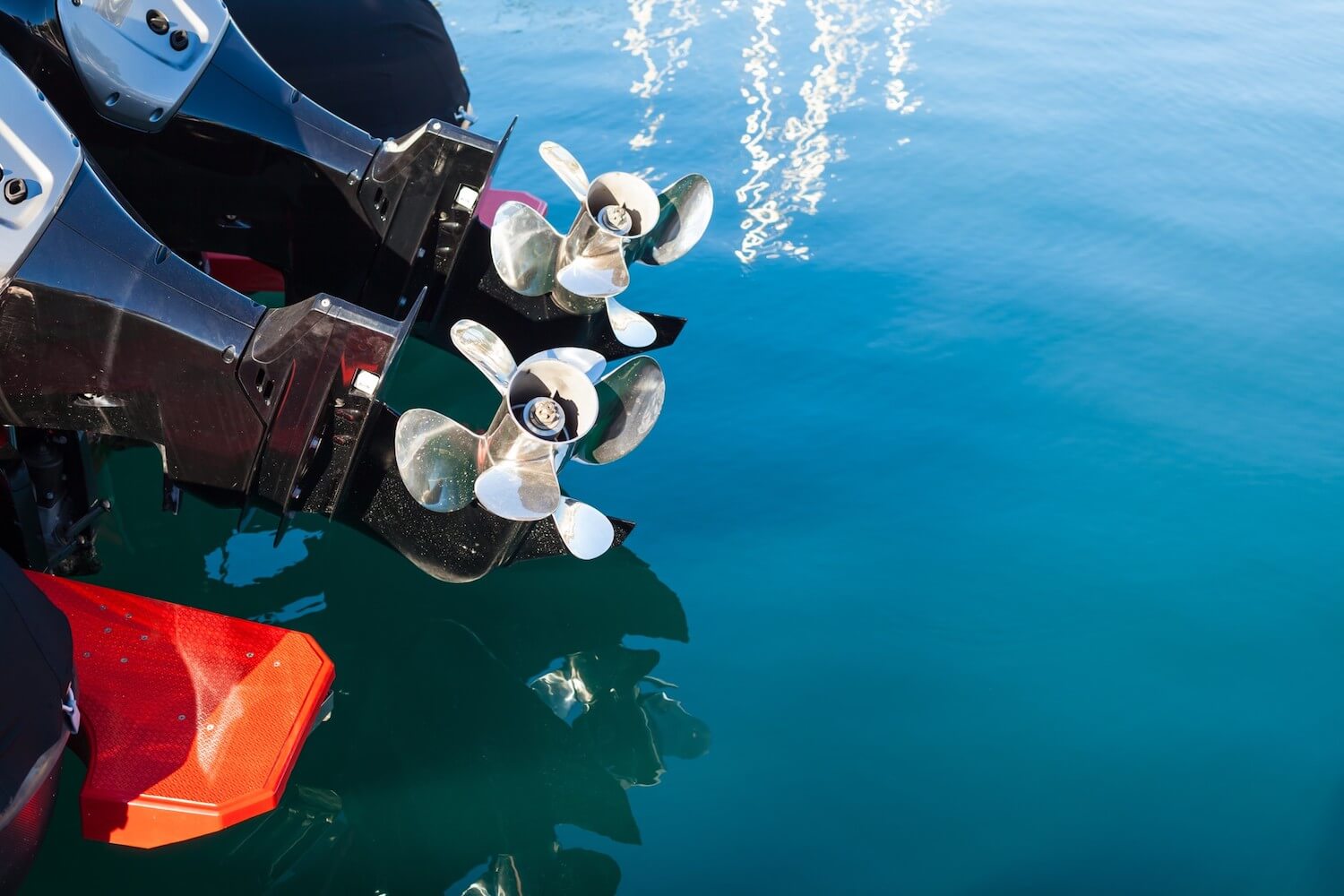The Cost of a Boat Engine Replacement
It is the sad time of the year again - the time to take your wallets out, because things are broken. Big things this time - your boat's motor. This article answers the question we might rather avoid: how much does it cost to replace a boat's engine?
So how much does it cost to replace a boat engine?
- sailboats with inboard engine: $5,000 - $10,000
- sailboats with outboard engine: $1,000 - $1,500
- most powerboats (inboard engine): $15,000 - $35,000
- small outboard engines (2-5 hp): $1,000 - $1,500
- large outboard engines (100+ hp): $10,000+
- installation cost: $200 - $2,000
I know that seems like a lot. But read on, as always, I will explore alternatives for you so that you pay as little as possible, given the circumstances.

On this page:
It is with a heavy heart that I must tell you that your boat's engine that used to propel your water adventures is now dead. After an appropriately long grieving period it is time to (wo)man up and do something about it.
As you might expect, an engine of a boat is an expensive component so prepare yourself for a sad text. If you have a long day behind you, better to leave the read for a refreshed morning.
Cost Depends On What Boat You Have
Asking how much it costs to replace a boat engine is like asking how much it costs to replace a car engine. The answer will vary widely on what kind of car you have and what do you want out of it once your new motor is fitted in.
That being said, there are ballpark figures that you can count on to give you an estimate that will make you resistant to unpleasant shocks upon seeing the bill.
Cost Of A Sailboat Engine
Let's start getting into the specifics. Firstly let me give you some good news - the cost of a sailboat engine is the lowest on the whole specter. Sailboats are wise enough to use engines as a secondary source of power, often necessary only for docking manoeuvres. And chances are that if you are here, you are a sailor.
Inboard sailboat engines

So if you are one of these lucky ones, your engine replacement will cost around $5,000 if you either want something smaller or get a good deal. $10,000 is the top of the range estimate you will have to pay in case you are looking for more power, and/or fancy one of the bigger manufacturer brands.
Outboard sailboat engines
If you run an inboard, expect to pay somewhere between $1,000 - $1,500. Most sailboats can do with a small 5 - 10 horsepower outboard engine without problems. These engines are easy to maintain and cheap to run. And they're cheaper to replace.
Also, you can easily install outboards yourself, so you won't have to account for any additional installation fees.
If you want to know what size engine your sailboat needs, you can read our article on How To Calculate Outboard Engine Size here.
Motorboat Engine Costs

Those who don't have to read these lines, don't. Things get sad here. If you are looking for a motorboat engine, chances are you need something a bit more powerful. An engine with 100-250 horses will easily cost you $15,000 to $30,000 with the sky being the limit if you want more power or something more special.
Outboard Engine Prices
This is probably not what you came for, but let's mention it just in case. If you can do with an outboard engine, you might get even better deals than those sailboat folks. A few (2-10) horsepower outboard engine will cost you around 1000 dollars with the cheapest being around a few hundreds.
Of course, if you want to sport a 200 horsepower outboard engine to show everybody who's the boss, then we are back in the big numbers and you might have to shell out $8,000 - $15,000 dollars.

Installation Prices
One last piece of bad news and then I promise I'll bring some sunshine. To the above costs, you gotta add a few hundred to a couple of thousand dollars for the installation itself. And no, it is not something you can likely do yourself - it isn't just unscrewing a motor and screwing a new one in.
The deciding factor of how much will this cost exactly is whether you can simply bolt the new engine in or whether you have to play with everything else including shaft logs, exhausts, electrics and so on.
Of course if you have an outboard engine the installation price will be nothing more than some sweat, swearing and back pain for a day or two.
Now comes the part where we talk about how to shave dollars off of the above quotes. So let's mention alternatives to boat engine replacement and discuss which ones make sense and which don't.
Is Being Cheap Worth It?
Not in this case. If you can afford it, go for the higher end engines, since a difference between a bad and a good brand can be thousands of hours of the engine's lifespan. After paying thousands of dollars for a new engine, you want to make sure that the next time you have to do that is as far away as possible.
Not to advertise, but Yanmars have a great reputation when it comes to reliability and longevity. Volvo made a good name for itself too. And not to get off-topic, but I have a lawn tractor made by this company and it is an indestructible beast.
Buying A Used Engine
Not recommended. If somebody is selling a used boat engine, they likely want to replace it with something new. So although you might be saving a lot compared to a new motor, be sure to do the math. In the long run you might be saving next to nothing. Especially when it comes to engines that ran in saltwater and have been accumulating corrosion for years - you don't know what you are getting and those cooling passages might be pretty rusty.
The only time you might want to purchase a used engine is if you can be a hundred percent sure of its condition and that condition makes sense money-wise.
Buying A Remanufactured Engine
Rebuilt engines have been taken apart, checked, cleaned, have had their faulty parts exchanged for good ones and they have been put back together. They might be anywhere from 10 to 50 percent cheaper than new engines, so if the specs fit your needs, consider this as a money saver.
Note there is a difference between fixing and rebuilding an engine. What you want to get here is a truly remanufactured engine, not something that has been quickly put into a workable shape.
Rebuilding An Engine
Whether you have this option depends on the extent of the damage, but overall, experts from the field say it makes little sense financially to have an engine rebuilt, compared to buying an already rebuilt engine. The consensus is that unless you will put in the mechanic's work yourself, (in which case prepare to put in a lot of time) you will be better off buying something already done.
The Perfect Time To Go Electric?
Though I am a fan of eco-solutions, this part is not written with ecology or sustainability in mind. But since you already have to put in the work, time and money to replace your engine, why not put in an electric one?
Before you start thinking that this is too far from your original goal (after all you just want your boat to work and you didn't come here to ride the green wave) hear me out. There are plenty of perks to electric engines that are very relevant to sailing.
There is a beautiful article by the people of Sailing Uma about how they replaced their normal motor for an electric one for just 1 400 dollars. They are DIY people, but even if they employed the services of professionals, the costs would be around 10 000 USD.
Let's get back to the obvious question - why? For one, there is the running cost. I don't need to compare the cost of charging your batteries and filling up your gas tank.
From seeing family saloon Teslas beat Ferraris and Corvettes in drag races, we all know who has the upper hand when it comes to performance, so no need to get into that either.
But a definite advantage is the silence and lack of vibrations. You know how everything gets noisy and shaky once you turn on a diesel engine on your average boat? Well, no more of that. Conversations under power can be as quiet and peaceful as those under sail. Oh yes, and the smell of gasoline and fumes? Gone.
Maybe the most important for the sake of this article is longevity. An electric motor is a very simple device. Classical petrol or diesel engine is complex, clunky and has a lot of moving components - in other words, plenty wear happens to a lot of parts even with normal usage. An electric motor has just one moving part and way fewer components than its explosive sibling. Thus it lasts way longer and professional level repairs can be done DIY once you learn a thing or two about it.
Comparing the pros and cons of an electric motor on a boat is material for another article, for now, I will leave you with hopefully enough enticement to do a bit of the old googling.
So there you have it. Not a cheap endeavor, is it? But if you get things right, you can get a lot for paying as 'little' as possible.
Did you find the answer to your specific question?
👍 10 👎 6
Comments
Claire Masters
I found it interesting when you said that rebuilding a boat engine is cheaper than buying a new one. My boat’s engine has been acting up and I was thinking of getting it replaced but I might just get it rebuilt. I don’t think I can rebuild the engine myself so I hope to find a company that offers this service in the next coming days. https://www.allseasonshonda.net/about
Isabella Manson
Thanks for sahring information in your blog
Greta James
My husband said last fall that we will need to think about replacing our outboard motor in the spring. Thank you for pointing out that there are different costs associated with motors for various boats. I think it would be smart for my husband to contact a specialist to understand what options we have for our vessel.
Erick Jewell
As someone still navigating this field, I find your posts really helpful. My site is <a href=”https://hansefood.com/bitrix/redirect.php?event1=&event2=&event3=&goto=http://article-world.com/eine-effektive-html-sitemap-erstellen">Article World</a> and I’d be happy to have some experts about SEO like you check it and provide some feedback.
Leave a comment